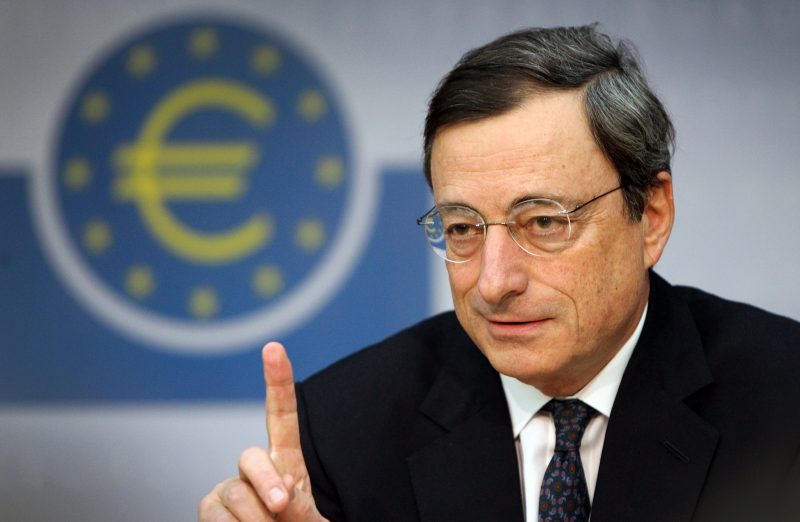ECB’s Draghi vows support for eurozone in ‘world far from normal’
ECB chief Mario Draghi laid out the latest set of ECB quarterly economic forecasts (DANIEL ROLAND)
Vilnius (AFP) – European Central Bank chief Mario Draghi on Thursday detailed prolonged support to the eurozone economy, saying the Frankfurt institution must keep shoring up financial conditions in a world “far away from being normal”.
Explaining a six-month extension of historic low rates, the Italian economist said “we are far away from normalisation because the rest of the world, and the rest of the challenges, are far away from being normal.”
For now, “the rising threat of protectionism, the geopolitical factors that are weighing on the eurozone economic outlook, would rule out any increase in interest rates,” he added.
The ECB’s main refinancing rate remains at zero, while financial firms must pay a negative interest rate of 0.4 percent on deposits with the central bank.
On top of the lower-for-longer move, Draghi said the ECB would offer highly favourable conditions to banks in a third round of cheap loans known as TLTROs.
If lenders pass on enough credit to the wider economy, the ECB could offer interest as low as -0.3 percent — in effect paying them to borrow money.
“The ECB has bought itself enough space to react to negative risks in the future,” commented economist Marcel Fratzscher of the Berlin-based DIW think-tank.
But the central bank enjoys “little support from politics, which should support the economy with an active fiscal and structural policy and move forward on important European reforms,” Fratzscher added.
– Lower forecasts –
Draghi laid out the latest set of ECB quarterly economic forecasts, which called for growth of 1.2 percent and inflation at 1.3 percent this year — slightly higher than in its March predictions for the 19-nation eurozone.
The central bank slashed its growth outlook for 2020 by 0.2 points, to 1.4 percent, as well as reducing the inflation forecast for next year to the same pace.
“Core” inflation, which excludes volatile items like food and energy, is weaker still.
Such figures mean the ECB’s years of interventions have made only inching progress towards its inflation goal of just below 2.0 percent.
It has held rates at rock-bottom and completed a “quantitative easing” (QE) bond-buying scheme amounting to 2.6 trillion euros ($2.9 trillion) between 2015 and 2018.
Both were designed to increase lending, economic growth and ultimately inflation.
But while jobs and wages — key contributors to inflation — have expanded, price growth has not followed in step as policymakers hoped.
Observers have pointed to trade disputes between Washington and key partners like China, Mexico and Europe as one reason for sluggish GDP growth and inflation.
Other risks weigh on the eurozone, including a budget confrontation between Brussels and Rome, Greek elections and a possible no-deal Brexit following the departure of British Prime Minister Theresa May.
With hoped-for solutions to some of the knotty issues failing to materialise in recent weeks and months, “uncertainty about global trade growth has extended beyond what we believed in March,” Draghi said.
He stressed the ECB’s “readiness to act in case of adverse contingencies” with its suite of monetary policy tools, including restarting bond-buying.
“The policy space is there,” Draghi said, although “we have not discussed which contingency would call for which instrument”.
– ‘More stimulus required’ –
“With the economy likely to remain weak and inflation well below the ECB’s near-two percent target, we think much more policy stimulus will be required, culminating in more QE during 2020,” commented Andrew Kenningham of Capital Economics.
Analysts have in recent weeks pointed to so-called “five-year/five-year” swaps — which reflect how financial players judge the pace of price growth between five and 10 years from now — close to their lowest ebb under Draghi’s eight-year tenure.
“The biggest risk for the ECB are the only weakly anchored inflation expectations,” DIW’s Fratzscher said.
“We are not at all accepting the current inflation rates or what the current expectations of inflation are,” Draghi said.
But price stability in the single currency area will not be his responsibility for much longer.
A changing of the guard is under way at the ECB, with a new chief economist already appointed and Draghi set to depart on October 31.
Disclaimer: Validity of the above story is for 7 Days from original date of publishing. Source: AFP.


